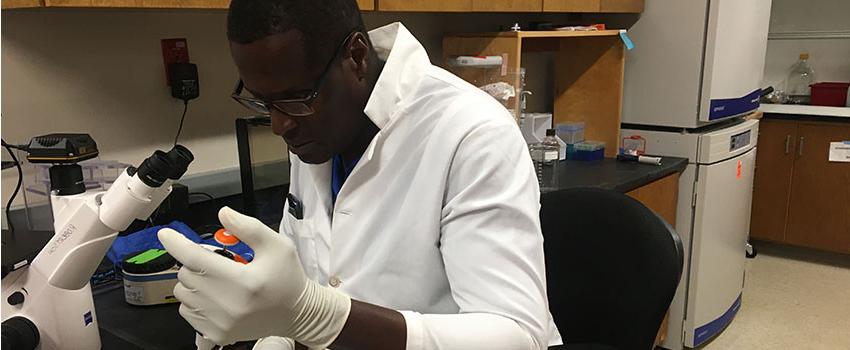Master of Science in Environmental Sciences
The University of South Alabama, through its Stokes School of Marine and Environmental Sciences, offers an interdisciplinary Master’s program in Environmental Sciences. Its students focus on understanding how toxins, pollutants, and other stressors affect the health of people, food webs, and ecosystems. Students in this program will learn to:
- Evaluate the impact of toxins, pollutants, and other stressors in the environment
- Perform laboratory and/or field studies to evaluate the impacts of toxins, pollutants, and stressors at a molecular level, as well as in organisms, populations, food webs, ecosystems, and in communities.
- Optimize and/or develop field or laboratory methods to identify and evaluate toxic substances in biota and in the environment
- Evaluate strategies to prevent, mitigate, monitor and/or control and manage toxic
substances relevant to environmental and human health
What is Environmental Sciences?
It has become increasingly evident that future scientists must be capable of working on interdisciplinary teams to address the challenges affecting human and ecosystem health. The urgent need for a well-trained workforce was clearly demonstrated along the northern Gulf Coast following Hurricane Katrina and the Deepwater Horizon oil spill. Longer-term changes associated with coastal population growth and the impacts of climate change globally also demand increased focus. A rapidly warming ocean, increased runoff from coastal urban centers, and expanding ranges and frequencies of harmful algal blooms require improved monitoring and development of effective assessment, monitoring, mitigation, and management to these stressors.
Environmental Sciences is a science based interdisciplinary graduate program. A workforce trained to address problems facing marine and estuarine environments is critical to protecting water quality, sustaining populations of living resources, managing habitats and mitigating the impacts of human activities. A master’s in environmental sciences prepares scientists to:
- identify and quantify the presence and impacts of pollutants, toxins and mixtures thereof in marine and estuarine waters.
- develop strategies to address the impacts of environmental toxicants and toxins and protect ecosystems, their delivery of critical services, and aquatic and human community health.
- communicate findings and data to stakeholders and policy makers to ensure effective strategies are implemented.
The program at South is designed to give students the advanced scientific knowledge and skills necessary to enter the workforce and make an immediate impact. Training focuses on the latest techniques in environmental toxicology, environmental chemistry, environmental monitoring, scientific communication, and a foundational background in environmental statistics.
Careers in Environmental Sciences
Program graduates will be positioned and qualified to pursue opportunities across multiple employment sectors, including academic research, state and federal government research and policy, industry, non-governmental organizations, private consulting and/or environmental monitoring, or any job requiring an M.S. degree in their original area of concentration. Alternatively, students may continue their education by pursuing a Ph.D. degree in Environmental Sciences or related areas (e.g., Marine Sciences, Biology, Biomedical Sciences).
Minimum Requirements For Admission
Applications for Fall admission are due by June 1 of each year, however, students should apply by April 1 for full consideration of funding opportunities. Enrollment normally begins in the fall semester; however spring admissions will be considered on a case by case basis. In addition to the general admissions requirements of the Graduate School, minimal requirements for admission in full standing to the MS Program in Environmental Sciences are:
- A baccalaureate degree in a related field (e.g., biology, biomedical sciences, chemistry, marine sciences, geology, physics, and environmental engineering) from an accredited four year college or university.
- An undergraduate minimum grade-point average of 3.0 overall (4.0 point system).
- Students applying to this program should have completed the following undergraduate courses with passing grades: biology; introductory statistics; and an upper division chemistry course(s). Applications will be evaluated holistically and substitutions may be accommodated on a case-by-case basis.
- Foreign applicants must meet all University entrance requirements and meet a minimum Test of English as a Foreign Language (TOEFL) score of 71 (or equivalent). More details for foreign applicants can be found here: http://5oqj.3327e.com/departments/international/requirements-deadline.html
The applicant will be required to submit:
- A completed application including a statement indicating the student's interests, professional goals, and project synopsis (for thesis students)
- Official transcripts from all undergraduate institutions attended
- At least two professional reference letters
The Master of Science degree in Environmental Sciences is awarded in recognition of the student's demonstrated ability to successfully complete a prescribed program of courses and research (at least 32 credit hours). Two tracks are possible including the thesis track and non-thesis (professional) track.
Students in the thesis track will work with a faculty advisor and student advisory committee to conduct original research (thesis) on a key topic in one of the environmental toxicology disciplines. For competitive thesis students a limited number of graduate research assistantships are available that may support 20 hrs of non-thesis work and tuition remission.
Students in the non-thesis (professional) track are not required to undertake original scholarly research (thesis), but instead complete an internship or capstone project (see below). Partial funding for non-thesis students may be available during internships.
Required Credit
To complete the required 32 hours of the degree, all students must complete the four core courses of the program (12 cr). The remaining coursework (6 cr) requirement should be met through elective courses related to the discipline that are approved by the program coordinator. Directed studies (6 cr) and thesis hours (8 cr) with a faculty advisor will be required to complete the degree requirements for thesis students. In the case of non-thesis students, thesis hours will be substituted with additional electives selected in consultation with the program coordinator.
Transfer Credit
A maximum of twelve (12) semester hours of graduate courses taken at another accredited university in the same (or closely related) subject as that of the masters program may be considered as part of the MS degree requirements at USA. Only grades of "A" or "B" may be accepted as transfer credits. The Graduate Coordinator will evaluate transfer credit; the transfer credit is approved by the Dean of the Graduate School only after completion of a minimum of eight semester hours of graduate course work in the MS program.
Recommended Schedule
Fall Semester Year 1
| Course Number | Course Name | Credit Hours |
|---|---|---|
| GIS 501 | Research Integrity | (1 cr) |
| EXT 515 | Environmental Chemistry (Lecture/Lab | (4 cr) |
| MAS/CE/BLY/PHA | Elective† | (3 cr) |
Spring Semester Year 1
| Course Number | Course Name | Credit Hours |
|---|---|---|
| ST 550 | Environmental Statistics | (4 cr) |
| MAS/CE/BLY/PHA | Elective† | (3 cr) |
| EXT 594 | Directed Studies Part I | (3 cr) |
Fall Semester Year 2
| Course Number | Course Name | Credit Hours |
|---|---|---|
| EXT 515 | Environmental Toxicology | (4 cr) |
| EXT 594 | Directed Studies Part Ii | (3 cr) |
| EXT 599 | Research Thesis Part I (On a subject identified jointly by the student and Advisory Committee |
(4 cr) |
Spring Semester Year 2
| Course Number | Course Name | Credit Hours |
|---|---|---|
| EXT 594 | Directed Studies Part III | (3 cr) |
| EXT 599 | Research Thesis Part II (Project Completion) | (4 cr) |
† Elective of to be determined by students (see list below)
Courses that may be used as electives*
| Course Number | Course Name | Credit Hours |
|---|---|---|
| MAS 601 | Physical Oceanography | (4 cr) |
| CE 579 | Fundamentals of Environmental Engineering | (3 cr) |
| SY 567 | Environmental Sociology | (3 cr) |
| CH 540 | Biochemistry I | (3 cr) |
| CH 541 | Biochemistry II | (3 cr) |
| BLY 544 | Molecular Biology | (3 cr) |
| PHA 643 | Molecular and Cellular Toxicity | (3 cr) |
*Others will be considered











